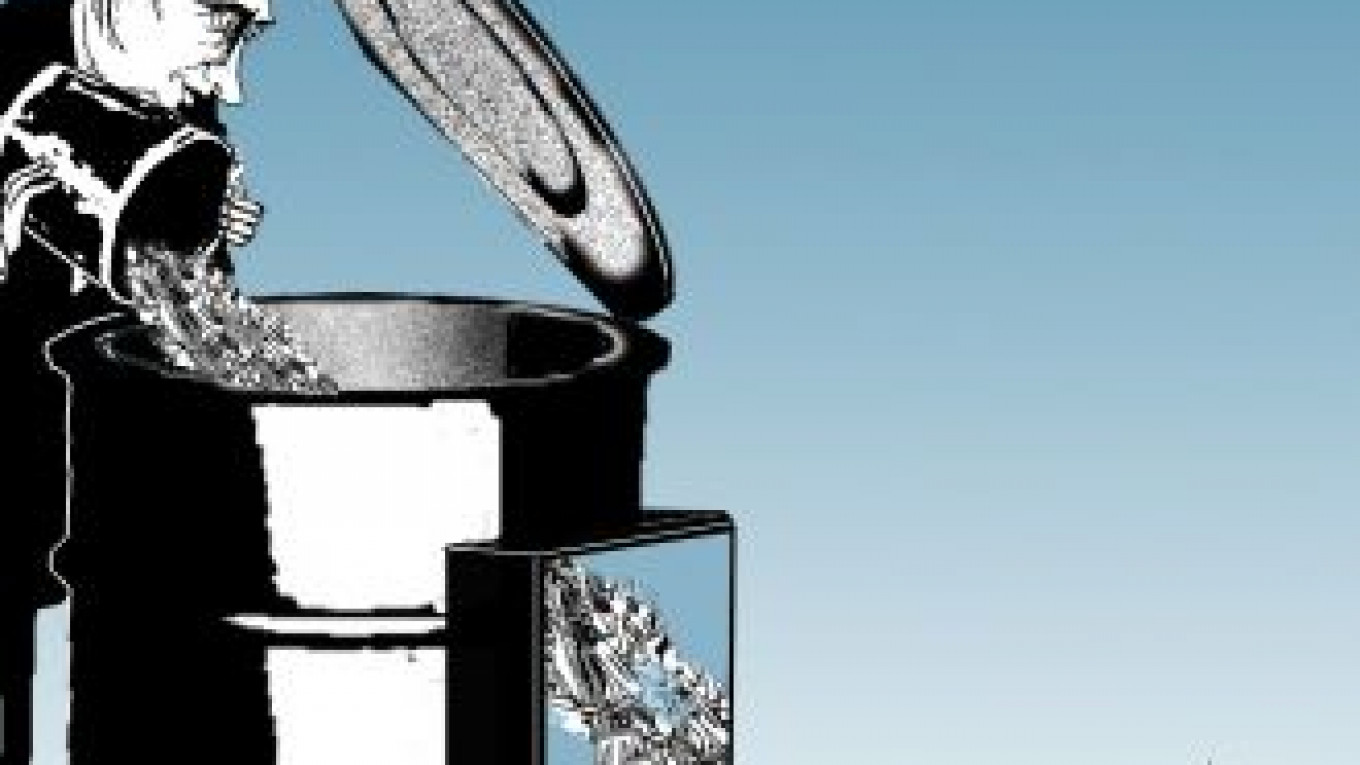Those who sincerely believe the conspiracy theory about a U.S.-funded color revolution in Russia may have felt relieved when the Foreign Ministry kicked out USAID, a major donor of the country's nongovernmental organizations, on Oct. 1. But now, according to "Anatomy of a Protest 2," aired last Friday on government-controlled NTV television, there is still reason to be concerned. The pseudo-documentary warns darkly that the revolution against the Kremlin is getting major financing from another source: Georgia.
The program showed hidden-camera footage in which a person resembling Givi Targamadze, the former head of the Georgian parliament's defense committee and a close ally of Georgian President Mikheil Saakashvili, tells someone resembling opposition leader Sergei Udaltsov that he can secure up to $200 million to stage a rebellion in Kaliningrad or recruit ultranationalists to storm the Kremlin.
In an interview that borders on delirium, political analyst Veronika Krasheninnikova explains how the U.S. has an interest in seeing fascists — a veiled hint at Udaltsov and his comrades-in-arms — come to power so it could have a pretext to invade Russia, extinguish the fascist threat to global peace, and presumably take over the country.
At the end of the program, the voiceover assures viewers that the hidden-camera footage was 100 percent authentic and will be handed over to law enforcement agencies to determine whether Udaltsov can be charged with attempted treason.
It didn't take long for the authorities to respond. A day later, on Saturday, Prosecutor General Yury Chaika ordered a criminal investigation into the information broadcast by NTV.
Although presented in all seriousness, the program resembles a crude and amateurish inside job in which intelligence authorities organized a ?hidden-camera setup against Udaltsov and handed over the tapes to NTV, which then gave the "evidence" back to the authorities.
Fortunately for Chaika, just a week before NTV broadcast the program the State Duma unanimously approved a bill in a first reading that would broaden the definition of "treason" and make it easier to prosecute suspects on the charge.
President Vladimir Putin, meanwhile, added fuel to the fire during an hourlong interview aired on NTV's "Central Television" program on his 60th birthday Sunday. While trying to show a softer side with home scenes where he fawns over his dog Koni, Putin referred to certain "boorish" members of the opposition's leadership as "???µ?»???…?°," or rubbish, who will be "sifted out" from the rest of the movement sooner or later. Before that, during his annual televised call-in show in mid-December, he referred to the grassroots opposition as "Bandar-log monkeys."
Thus, the Kremlin and the television networks that it controls are continuing a campaign of demonizing the opposition. If the Kremlin decides to tighten the screws further, the propaganda drive could be followed by the arrest of Udaltsov, Alexei Navalny and other opposition leaders on treason or trumped-up corruption charges.
But Putin is fooling himself if he thinks such tactics will cause the opposition to call off its protests or that its legitimate complaints against him will somehow vanish. At some point, he must enter a dialogue with the opposition's leaders and address their concerns.
But this is unlikely from Putin, who memorably said in 2009 that the more time he spends with people, the more he loves dogs. This may be good news for Koni, but it spells disaster for the country.
Michael Bohm is opinion page editor of The Moscow Times.
Related articles:
A Message from The Moscow Times:
Dear readers,
We are facing unprecedented challenges. Russia's Prosecutor General's Office has designated The Moscow Times as an "undesirable" organization, criminalizing our work and putting our staff at risk of prosecution. This follows our earlier unjust labeling as a "foreign agent."
These actions are direct attempts to silence independent journalism in Russia. The authorities claim our work "discredits the decisions of the Russian leadership." We see things differently: we strive to provide accurate, unbiased reporting on Russia.
We, the journalists of The Moscow Times, refuse to be silenced. But to continue our work, we need your help.
Your support, no matter how small, makes a world of difference. If you can, please support us monthly starting from just $2. It's quick to set up, and every contribution makes a significant impact.
By supporting The Moscow Times, you're defending open, independent journalism in the face of repression. Thank you for standing with us.
Remind me later.


